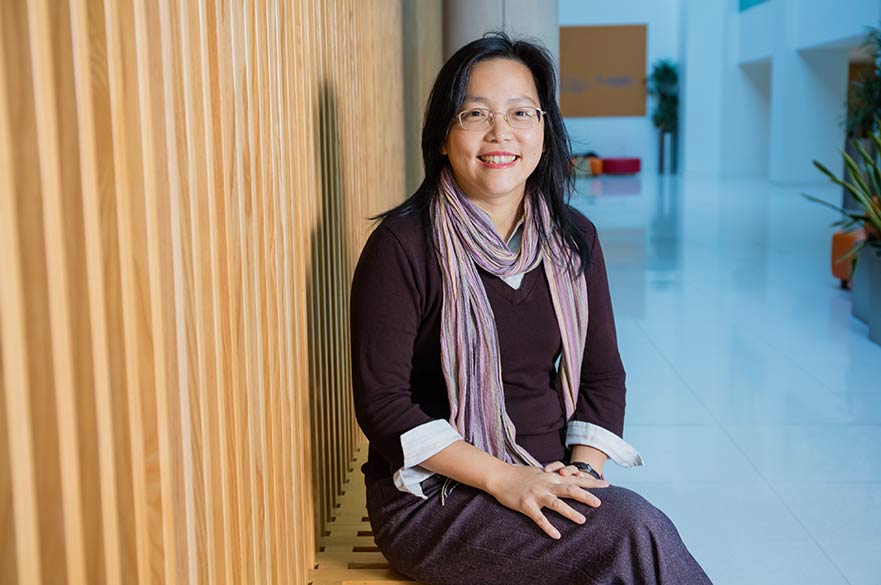Role
Dr Amy Wang is the Course Leader for MA TESOL at Nottingham Trent University. She has been an MA Course Leader for more than ten years. While her research specialises in pragmatics, corpus linguistics and discourse analysis, Amy always takes a keen interest in applying the knowledge of linguistics to English Language Learning and Teaching.
Amy teaches the following MA modules:
- Investigating Language in Use (MA TESOL)
- Research Methods (MA TESOL)
- Exploring English Language Learning and Teaching (MA TESOL)
- Teaching English to Young Learners (MA TESOL Option Module)
- Semantics and Pragmatics (BA English Language and Linguistics)
Amy won an NTSU Outstanding Teaching Award (School of Arts and Humanities) in 2017. This is a student-led award, voted on by students in recognition of a staff member’s dedication to helping students reach their potential. In 2019 and 2021, Amy was again nominated by students. Some of the comments made by students include:
“Amy has been a great teacher and a great support for us all. She is incredibly knowledgeable and extremely kind. She understands students’ needs and concerns, and is always ready to help. In my school and university experience I have never met such an amazing teacher. She is an example for all of us who want to become teachers.”
“Amy is a very supportive and motivating lecturer. She is very approachable, and attentive to all students ensuring students are enjoying the course, or need any advice and help. She is an excellent role model!”
Career overview
Amy completed her PhD in Applied Linguistics at Lancaster University. Prior to her PhD studies, Amy worked in a number of projects to document endangered aboriginal languages in Taiwan. She also taught English as a foreign language to young learners, junior high school students and university students for eleven years.
She joined Nottingham Trent University in 2014, as the MA Course Leader. Before NTU, Amy led a similar course at Manchester Metropolitan University.
Research areas
Amy’s research involves the use of corpus approaches in studying pragmatics, and applications to language learning and teaching. She welcomes PhD proposals in the following areas especially:
- Pragmatics, in particular Intercultural Pragmatics, L2 Pragmatics, and corpus approaches to Pragmatics
- Corpus Linguistics
- Language vagueness, and vague language in context
- Using corpora in language learning and teaching
Amy has supervised the PhD projects below:
Jessica Frye, on “The terminography, lexicography and phraseology of Tibetan Buddhist English: A corpus approach to Tibetan Buddhist English and its pedagogical implications”.
Nawal Alaquash, on “Interpersonal Apology Strategies and Responses to Apologies in a Saudi Arabian context”.
External activity
Amy’s external roles include:
- External Examiner for a number of PhD theses in British universities
- Reviewer for leading international journals (e.g. Journal of Pragmatics and Languages in Contrast)
- Member of the British Association for Applied Linguistics.
Sponsors and collaborators
Amy has been leading the MA TESOL/MA ELT team in validating an international collaboration with VN-UK, at Da Nang University in Vietnam. This contributes to the university’s vision of developing and facilitating students’ learning by global collaboration.
Publications
Amy has presented papers regularly in the conferences and published in the international journals.
Selected Conference Presentations:
- Smith, N. and Wang, A. 2014. ‘Colloquialization and a century in the life of vague quantifiers’. ICAME 35, Nottingham University, May 2014.
- Smith, N. and Wang, A. 2010. ‘Much ado about much, a lot and a bit: quantifiers and colloquialization in 20th-century English’. British Association of Applied Linguistics conference, Corpus SIG, Aberdeen, Sept. 9.
- Bullo-Alos, S. and Wang. 2009. ‘Parental attitudes to language learning in Arabic and Chinese supplementary schools: a case study’. BAAL Language Learning and Teaching SIG Conference, Manchester Metropolitan University, Manchester.
- Wang, A. 2008. Quantifying vagueness in interaction? Some evidence from courtroom discourse. BAAL, University of Swansea, Wales.
- Wang, A. 2007. ‘Vagueness in court: a corpus-based analysis of explicit vagueness devices in Taiwanese and British courtroom discourse’. International workshop on Corpora, Discourse and Style. University of Sassari, Italy.
- Wang, A. 2005. ‘Vagueness as a court strategy: a corpus-based approach to vagueness in British and Taiwanese courtrooms’. International Conference of Pragmatics (IprA), Riva del Garda, Italy.
- Wang, A. 2005. ‘When precision meets vagueness: a corpus-based approach to vagueness in Taiwanese and British courtrooms’. 7th Biennial Conference on Forensic Linguistics/Language and Law. University of Cardiff, Wales.
- Wang, A., J. Szakos and N. Smith. 2005. Digitalizing endangered languages: What should be documented and who decides? Digital Resources for the Humanities. September 2005, Lancaster University, UK.
- Wang, A. and J. Szakos. 2002. Demonstratives, deixis or discourse markers? A corpus-based study on kani’i (this) and kana’a (that) in Sa’arua. International Conference on Austronesian Languages. (ICAL9) Australia National University, Canberra, Australia.
- Szakos, J. and A., Wang. 2001. Not last, even if least: Endangered Formosan aboriginal languages and the corpus revolution. International conference on corpus linguistics (CL2001). Lancaster University, Lancaster, UK.
- Selected publications:
- Wang, Amy Y-T. (in preparation) Vagueness in interaction: evidence from courtroom discourse. (To be submitted to Journal of Pragmatics)
- Smith, Nicholas and Amy Y-T. Wang (in preparation) ‘Colloquialization and a century in the life of vague quantifiers’.
- Wang, Amy Y-T. (2010). ‘Vagueness in court: a corpus-based analysis of explicit vagueness devices in Taiwanese and British courtroom discourse’. Corpora, Discourse and Style. Rome: Aracne.
- Wang, Amy Y-T. and Scott Songlin Piao. (2007). ‘Translating vagueness? A study on translations of vague quantifiers in an English-Chinese Parallel corpus’. In M. Davies, P., Rayson, S., Hunston and P. Danielsson (eds.) Proceedings of the Corpus Linguistics Conference CL2007.
